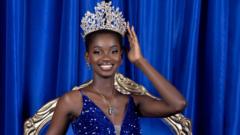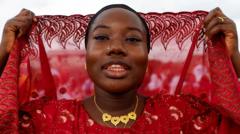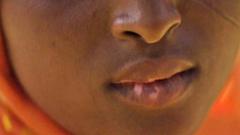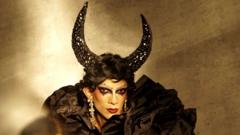With the recent introduction of new rules in the Miss Ivory Coast pageant, contestants must showcase their natural hair, marking a significant shift in beauty standards and sparking discussions about identity and self-perception in the West African nation.
Beauty Pageants in Ivory Coast Embrace Natural Looks

Beauty Pageants in Ivory Coast Embrace Natural Looks
The Miss Ivory Coast competition enforces a ban on wigs and extensions, promoting authentic beauty and self-expression among contestants.
Long-standing beauty norms of the Miss Ivory Coast pageantry are undergoing a radical transformation as the competition's organizers have decreed a ban on wigs, weaves, and hair extensions for preliminary rounds, a move aimed at celebrating natural beauty. Historically, beauty contestants in the West African nation have favored long, artificial hairstyles, often infusing significant amounts of money into their appearances.
Marlène-Kany Kouassi made headlines as one of only two winners in the pageant's six-decade history to don her crown with natural hair in 2022. Her victory highlighted the clash between traditional beauty standards and the growing push for authenticity, a sentiment echoed by more recent winners like Angélique Angarni-Filopon of Miss France fame, who proudly wore her short Afro at age 34.
Victor Yapobi, the president of the Miss Ivory Coast organizing committee, emphasized the importance of promoting genuine beauty, stating, "We want the candidates to be natural - whether with braids or straightened hair, it should be their own." This shift not only discourages cosmetic enhancements, such as skin lightening and surgeries, but also permits a broader range of women to compete by lowering the minimum height requirement and entrance fees.
Initial reactions from contestants like Emmanuella Dali have been overwhelmingly positive, with many feeling a newfound pride embracing their natural hair over their previous inclination toward wigs. However, the ban has ignited a healthy debate about beauty standards and freedom of expression, challenging norms deeply entrenched in Ivorian culture.
Not everyone supports the new regulations. Some contestants, including 24-year-old Astrid Menekou, expressed concern that the rule limits personal style potential. The hair industry in Ivory Coast, valued at over $300 million, could face economic repercussions as local businesses that specialize in wigs and extensions worry about reduced demand.
Despite this, the movement toward natural beauty mirrors a global trend in which natural hair is increasingly embraced, albeit with lasting stigmas in professional spheres. This ongoing dialogue around beauty standards could reshape perceptions not just within pageants, but also in broader Ivorian society.
With preliminary rounds now underway and the final event scheduled for June 2025, Yapobi remains optimistic about the enduring success of the initiative. "If it works, we'll continue and carry on this initiative in the years to come," he said.
The recent trend signifies a monumental shift in the definition of beauty in Ivory Coast. Contestants like Doria Koré, named Miss Haut-Sassandra, feel that winning with natural hair symbolizes the true essence of African beauty, while others leave the competition with a renewed sense of confidence. "I didn't win, but I feel proud. This is who I am," Dali remarked, highlighting the deeper implications of this evolving beauty paradigm.

















